MAVERICK CITIZEN
isiXhosa ‘storyboards’ bring Covid vaccine campaign to life in rural Eastern Cape
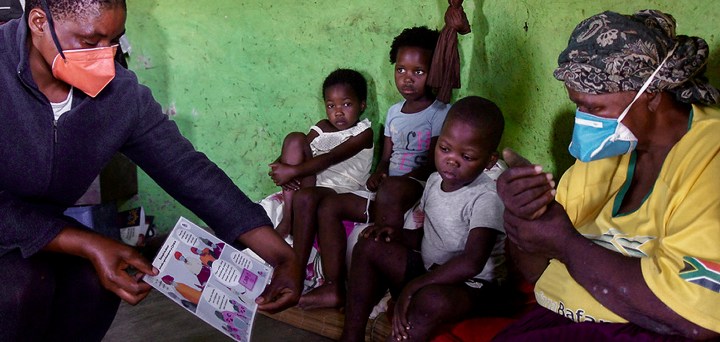
A community-based organisation in one of the most rural parts of the Eastern Cape has launched its own isiXhosa vaccine literacy campaign by radio, Whatsapp and poster to include its community in the national conversation.
The four villages of Xhora Mouth in the Eastern Cape are not only physically isolated from the rest of South Africa, but have been excluded from the predominantly English official national Covid-19 conversation.
Community-based organisation Bulungula Incubator has rallied the reach of radio, WhatsApp and community healthcare workers to answer their villages’ specific questions in isiXhosa, the predominant language in the area.
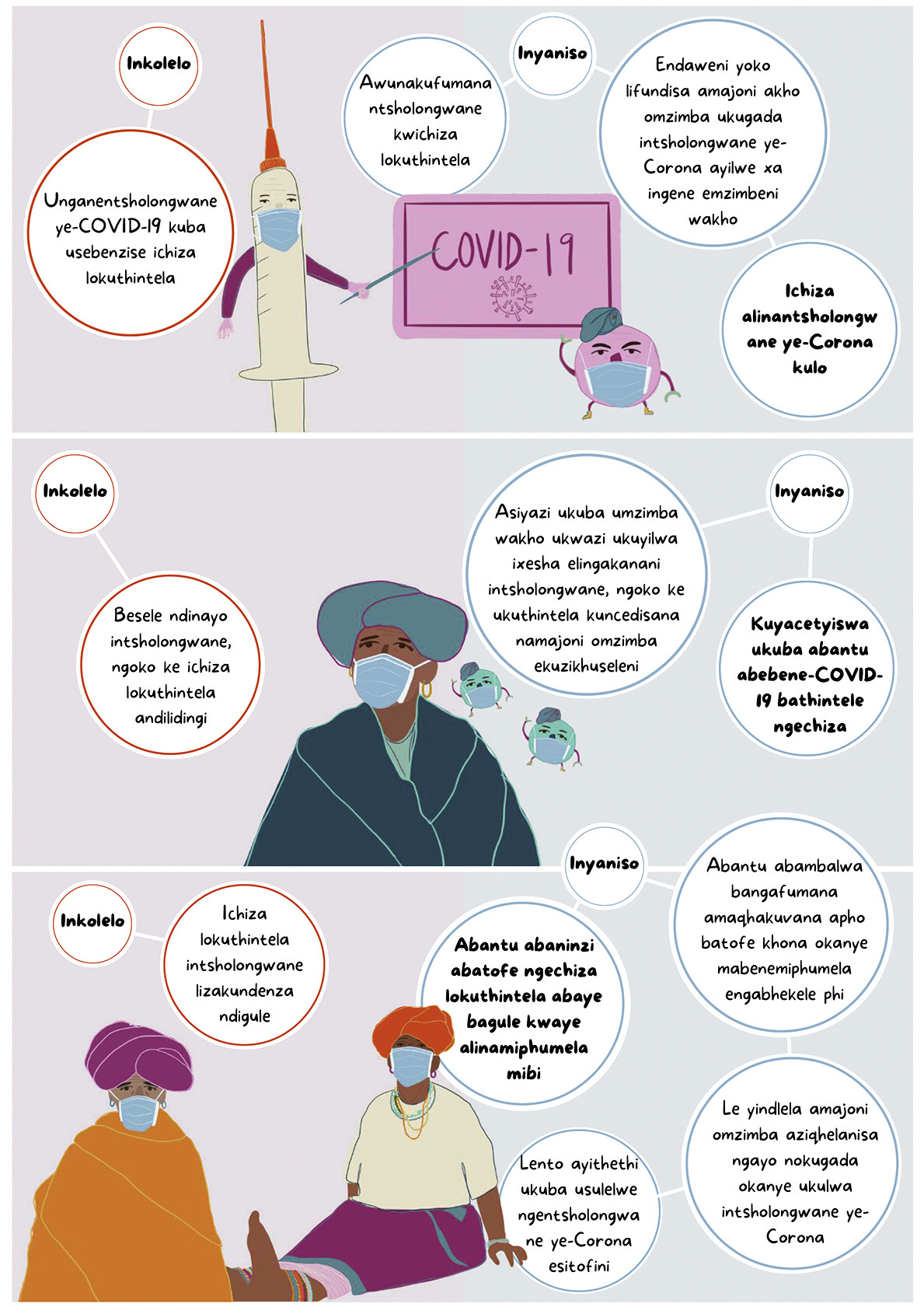
The storyboards by Bulungula Incubator.
The more they explain, the more follow-up questions they get. The more resources they put out, the further they travel.
The community has been hit hard by Covid-19, says Lynne Wilkinson, a public health specialist who is the acting director of the organisation. In January, they had a 38% positivity rate.
However, mortality has remained fairly low, and this might be because of the cardiac health of their elderly. “An 80-year-old lady is still walking down to the river every day and fetching wood in the forest. People are very active,” Wilkinson explains.
The community has no electricity and cell phone reception is scarce, making online learning near impossible, explains Nosintu Gwebindlala, the deputy senior traditional leader of the Jalamba Traditional Council.
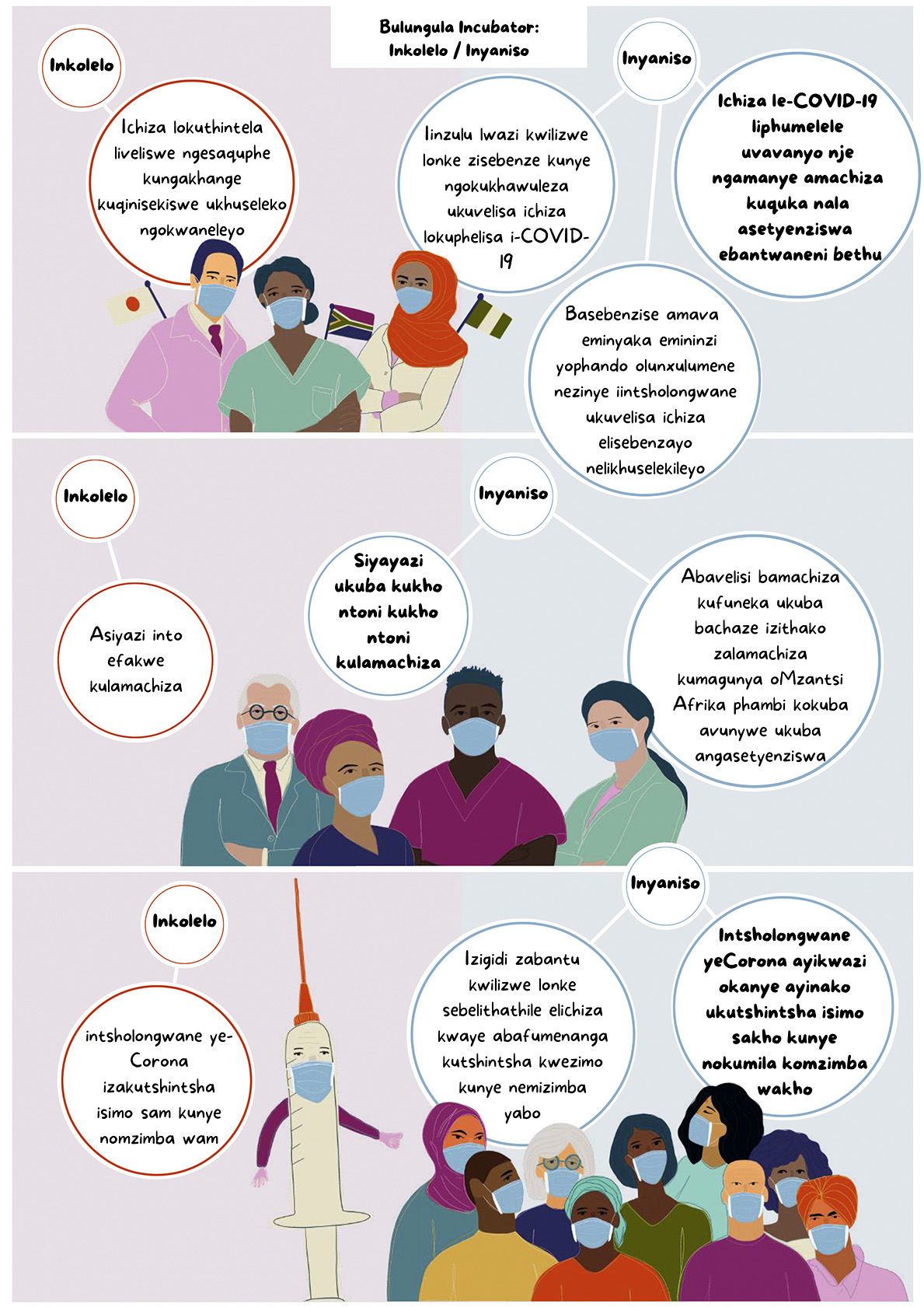
The storyboards by Bulungula Incubator.
Wilkinson says schooling has been severely disrupted – the children worry about the days they’ve lost and the ones they might miss as the next wave of infections arrives.
In addition, unemployment has increased as community members who are migrant workers lost their jobs, says Gwebindlala. The stigma attached to those who test positive for Covid-19 is another hurdle.
The closest hospitals are half a day’s travel away over bad roads in a canopied bakkie taxi. This meant community healthcare workers picked up the mantle to spearhead the local Covid-19 response with the support of the Bulungula Incubator. They have been screening people during home visits and referring them for community-based Covid-19 testing provided by the nurse at their village health point. They helped to protect and isolate the elderly. They checked in on sick patients daily. They referred people to hospitals. They organised taxi ambulances. The list goes on.
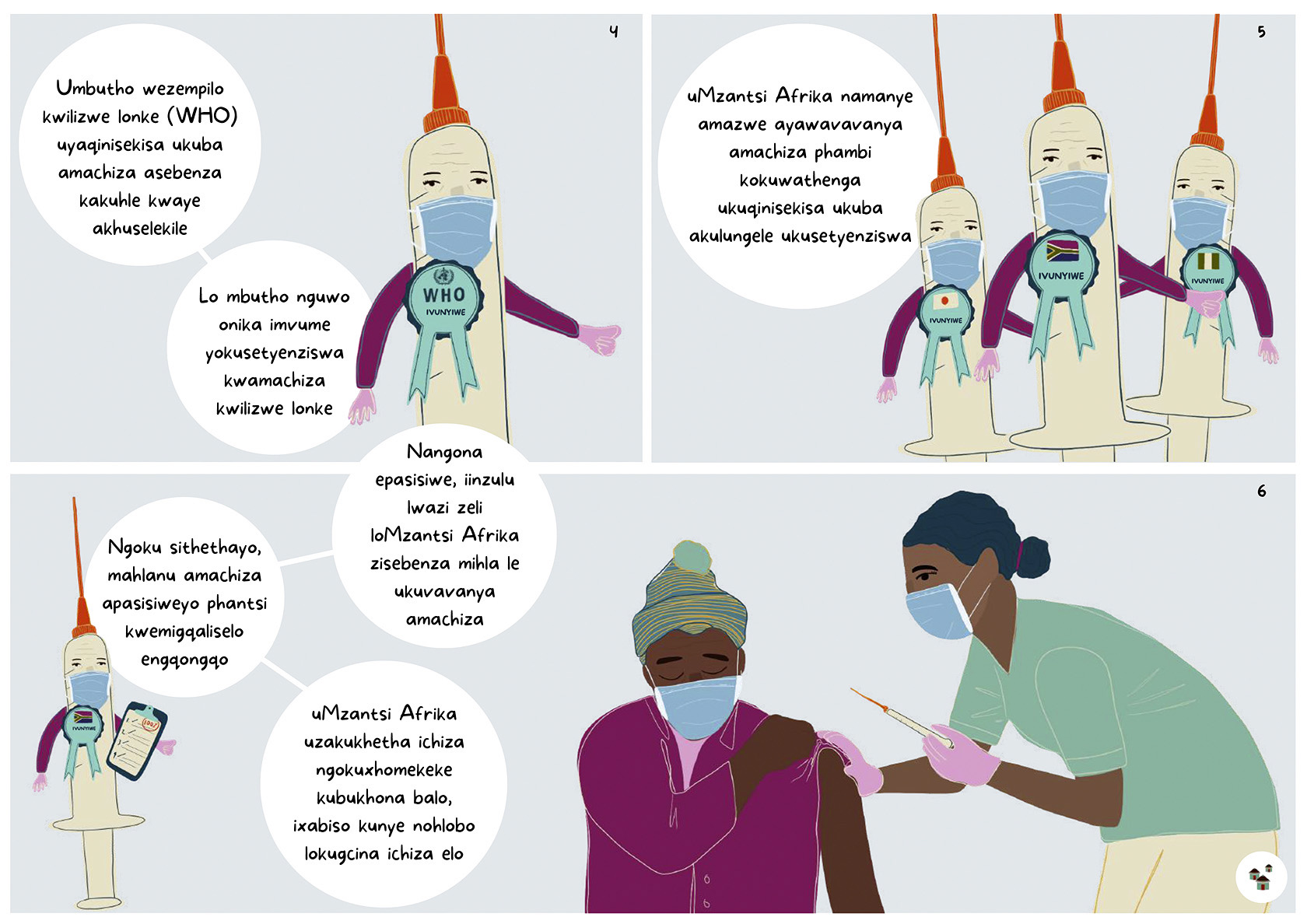
The storyboards by Bulungula Incubator.
“In the new year, we’ve been very worried about our access to Covid-19 vaccines here in deep rural Eastern Cape. We might have Phase 1, 2 and 3 in South Africa but will there be Phase 5, 6 and 7? When will the vaccines ever reach deep rural areas?” asks Wilkinson.
She expects vaccines are months away, but it presents an opportunity to prepare the community for vaccination.
The organisation sensed some resistance to Covid-19 vaccination and wanted to understand why. “People here are not anti-vaxxers. Community members are very good at taking their children for immunisation. So where was the resistance coming from?”
Workshops were conducted to find out what people were worried about and set about answering their questions.

The storyboards by Bulungula Incubator.
Reliable information in isiXhosa was not forthcoming from government, and social media was a torrent of misinformation, says Wilkinson. So, they decided to write, translate, illustrate and distribute their own information.
The organisation is publishing a series of “storyboards” on vaccines in isiXhosa. Wilkinson writes the health information, which is then translated by local author and translator Hombakazi Mercy Nqandeka and illustrated by Sigrid Kite.
The boards are printed and laminated to be put up in spaza shops, taverns, schools and the Bulungula Incubator health point. The community healthcare workers use them as educational tools during home visits. They are spread on WhatsApp groups and adapted into community radio shows.
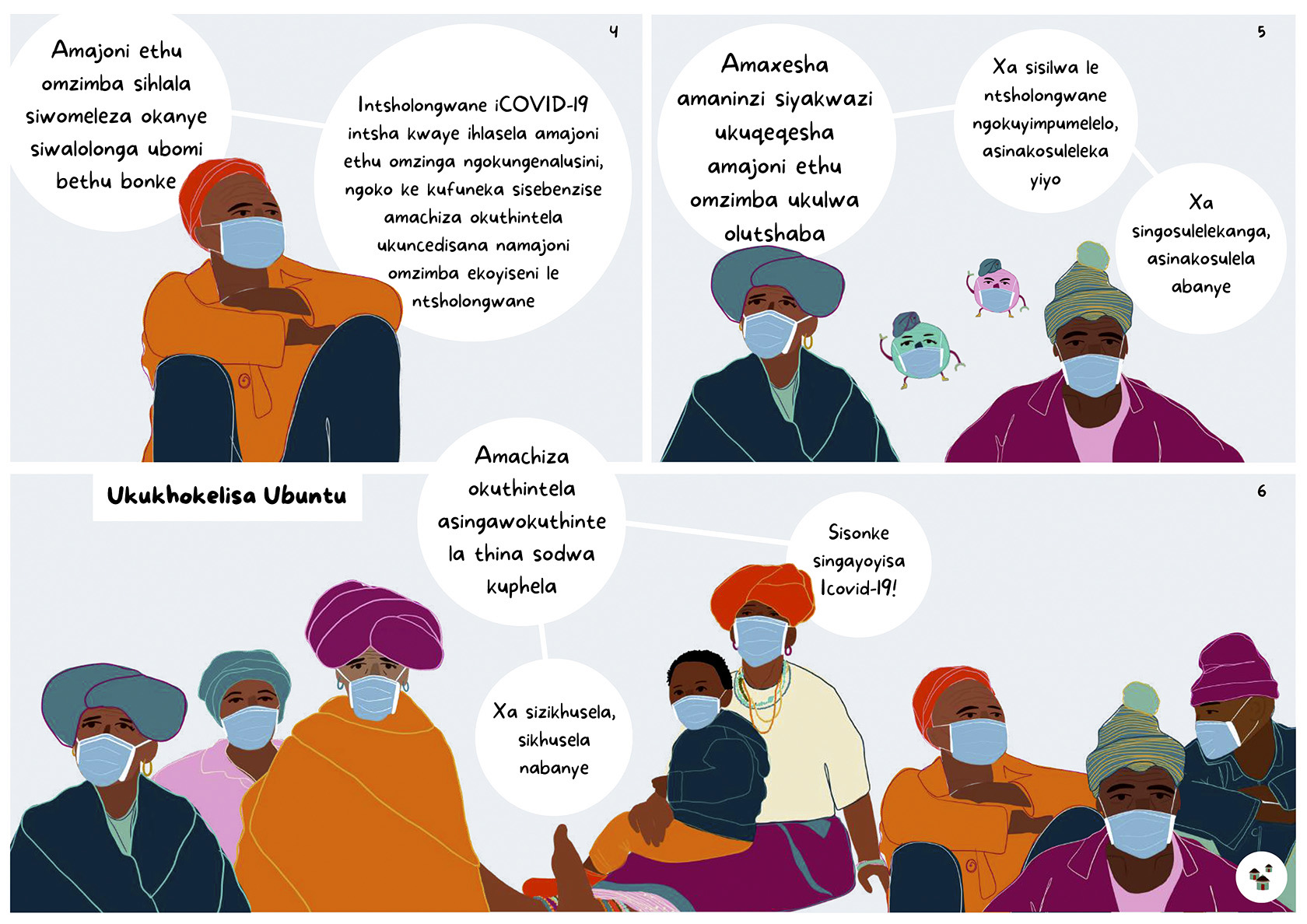
The storyboards by Bulungula Incubator team members.
They are designed to answer people’s specific questions and make them feel comfortable, explains Wilkinson.
“People here aren’t particularly concerned with which vaccine it is, but much more about adult vaccination. They haven’t been vaccinated as adults It’s an extremely foreign concept to go and get vaccinated as an adult. There’s that foundational step that we’ve missed. This is new to people. Vaccination is not new, but there’s a big leap from child immunisation to adult vaccination,” she explains.
It also counters misinformation from social media. “Prior to our vaccine literacy campaign, many people were reading untrue stories from social media. Now with the storyboards, they are receiving reliable information from reliable sources,” says Bongezwa Maleyile, a community healthcare worker in Xhora Mouth.

The storyboards by Bulungula Incubator team members Lynne Wilkinson, Hombakazi Mercy Nqandeka and Sigrid Kite to provide the community of Xhora Mouth with reliable vaccine information in isiXhosa.
The fact that they are written in isiXhosa makes people more interested, says Nqandeka. “I’ve seen people who are not very literate take time and engage with it. I’ve seen them chuckle to see the boards and the isiXhosa words. I think it gets close to their hearts because it’s written in a language they can read and understand.
“Normally, notices are written in English and someone will see that and look away. But when they see wow, that’s an isiXhosa word then they want to see what else it says. It pulls their attention towards the poster,” she explains.

Community healthcare worker Vuliswa Dyubhele uses a story board to explain the ins and outs of the Covid-19 to Nopasile Malima at her home in Nqileni Village on 10 March 2021. (Photo: Sigrid Kite)
Creating representative art of our community and its people is incredibly important, says Kite. “Not only is it important to share community-relevant information, but it is also important to build credibility for attitude and behaviour change. People want to be seen. Seeing art that represents you and your community leaves a positive impression.”
It was important for the storyboards to focus on elders, in particular, because they are the most vulnerable to Covid-19. In addition, they are key leaders in the community who have considerable influence over younger generations, Kite explains.
They have had little exposure to adult vaccination, so it is key for them to understand and trust the vaccines before they arrive. “If we can get buy-in from the elderly community members to take the vaccine, they will then influence and encourage others in the community to follow suit.”
Radio has been crucial in the Covid-19 response. As soon as the Covid-19 pandemic was declared, the Bulungula Community Radio DJs adapted their scripts to incorporate health messaging and information. They attended workshops provided by the Bulungula Incubator to make sure they understood the crisis before going on air, explains station manager Mzuzile Mhlola.
Since then, the 19 youth DJs have been interviewing community healthcare workers, doctors and nurses on air. Mhlola explains they worked hard to remain creative to keep their listeners’ attention from 6am to 8pm. Now, they have adapted the storyboards into radio show segments.
The radio is the central channel of communication in the community, explains Mhlola. It is so trusted that when they encouraged people to get tested, the nurse reported that there was an increase in people coming to get tested.
The Bulungula Incubator has been serving the community for years and has never disappointed them, he says. “This means people trust them and also the radio station. That trust helps a lot.”
He has seen a positive reaction to the interviews about Covid-19 in particular. The audience grew rapidly – the station saw its highest level of phone-in listener participation ever.
“People can phone in and ask questions of the guests. They always strive to know more; it seems that as we speak and share, it encourages them to want to know more,” he explains.
The storyboards are travelling too. Mhlola converts the radio shows into recordings, which are posted on a WhatsApp group so that community members who have moved away can stay connected. They have been used at the two closest hospitals, as well as by Doctors Without Borders in Khayelitsha, Cape Town.
“It shows you that there is a gap … you have a little NPO out in rural Eastern Cape making them [storyboards] and they’re being taken up all over the place,” Wilkinson chuckles.
It is “absolutely key” that community healthcare workers are vaccinated to become “vaccination ambassadors”, says Wilkinson.
“Many of our community members are going to be looking to see who they personally know is having the vaccine… We need to document that through photographs and interviews on the radio so that people feel comfortable that they are fine and nothing bad happened to them. That means we first have to get the vaccines here.”
Maleyile agrees. “For our communities, access to medical services is an ongoing challenge. The nearest hospitals are far away, requiring people to pay for taxi rides, wait uncertain hours for an ambulance, or navigate the long distance by foot, which takes a full day.
“We urgently need to protect our community members with the vaccine. I think government should prioritise rural communities to get the vaccine first.” DM/MC
There are various ways to support Bulungula Incubator’s vaccine literacy programme. Visit bulungulaincubator.org to see how.
"Information pertaining to Covid-19, vaccines, how to control the spread of the virus and potential treatments is ever-changing. Under the South African Disaster Management Act Regulation 11(5)(c) it is prohibited to publish information through any medium with the intention to deceive people on government measures to address COVID-19. We are therefore disabling the comment section on this article in order to protect both the commenting member and ourselves from potential liability. Should you have additional information that you think we should know, please email [email protected]"





 Become an Insider
Become an Insider